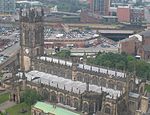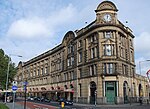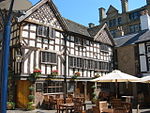Chetham's Library

Chetham's Library in Manchester, England, is the oldest free public reference library in the English-speaking world. Chetham's Hospital, which contains both the library and Chetham's School of Music, was established in 1653 under the will of Humphrey Chetham (1580–1653), for the education of "the sons of honest, industrious and painful parents", and a library for the use of scholars. The library has been in continuous use since 1653. It operates as an independent charity, open to readers free of charge, Monday-Friday 09.00-12.30 and 13.30-16.30 by prior appointment. Tours of the Library for visitors are bookable online from 2 September 2019 via the Library website.The library holds more than 100,000 volumes of printed books, of which 60,000 were published before 1851. They include collections of 16th- and 17th-century printed works, periodicals and journals, local history sources, broadsides and ephemera. In addition to print materials, the library holds a collection of over 1,000 manuscripts, including 41 medieval texts.Chetham's Library is an Accredited Museum under the Arts Council England Accreditation scheme. The whole of its collections are Designated as a collection of national and international importance under the Museums, Libraries and Archives Council Designation scheme, now administered by Arts Council England.Paintings featured as a part of the library's fine arts collection include portraits of William Whitaker, the Reverend John Radcliffe, Robert Thyer, the Reverend Francis Robert Raines, and Elizabeth Leigh. The collection includes An Allegory with Putti and Satyrs, oil on canvas, attributed to sixteenth century artist and Netherlander Vincent Sellaer.One of the most substantial collections pertains to Belle Vue Zoo and Gardens, Manchester's most renowned entertainment attraction and zoological centre, in operation from the 1830s to the 1980s. The collection contains thousands of posters, programmes and photographs, as well as the financial and business papers of the owner, John Jennison; large numbers of items in this collection are available in digitised form online. A 2014 grant of £45,000 obtained by Chetham's Library allowed curators to make the collection available to online users, via digitization projects.
Excerpt from the Wikipedia article Chetham's Library (License: CC BY-SA 3.0, Authors, Images).Chetham's Library
Fennel Street, Manchester City Centre
Geographical coordinates (GPS) Address Phone number Website Nearby Places Show on map
Geographical coordinates (GPS)
| Latitude | Longitude |
|---|---|
| N 53.4866 ° | E -2.2439 ° |
Address
Chetham's School of Music
Fennel Street
M3 1SB Manchester, City Centre
England, United Kingdom
Open on Google Maps










